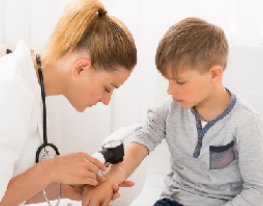About Us

- Women's Dermatology
- Geriatric Dermatology
- Hansen's Disease
- Venereology
- Skin Biopsy
- Targeted Phototherapy
- Cryotherapy
- Treatment of Warts
- Keloids
- Mole Mapping
- Allergy Patch Testing
- Wood's Lamp Examination
- Milia and Molluscum extraction
- Treatment of Corns and Calluses
- Medical Dressings
- Testing for Fungal Infections
- Chamber Phototherapy
- Dermatoscopy
Pediatric Dermatology
This field is particularly close to my heart and has been a special area of interest for years. Parents often think that a skin condition in the child must be attended to by a paediatrician. And if they cannot manage the ailment, then a dermatologist is brought into the picture. It is in fact the other way around. All skin rashes in a child must first be diagnosed and treated by a dermatologist. A paediatrician may miss several salient features. Certain pediatric skin ailments may be an indication of systemic (internal) disease. In such cases, a dermatologist must work with a paediatrician / surgeon / endocrinologist / rheumatologist / allergologist to provide complete and thorough treatment.
Pediatric Dermatology involves the examination, diagnosis and management of dermatological conditions in children, including infants and neonates. Certain disorders only occur in the pediatric age group. On the other hand, treatment of severe eczema, psoriasis or vitiligo in this age group requires a different approach and greater care in administering long term medication with the least complications.
A large part of our job is in training and educating parents in the effective skin care of their wards. This improves treatment outcomes and long term disease control. Our facility offers a fun-filled, friendly, non-intimidating and creative space for our tiny tot patients. Our kiddie patients are happy and cooperative. Parents feel relaxed and calm as well.

Pediatric Dermatology involves the examination, diagnosis and management of dermatological conditions in children, including infants and neonates.
Treating Acne
The treatment of acne is aimed at dissolving the follicular plug, reducing the oil production, killing the P. Acnes bacteria and reducing inflammation. Different creams and antibiotic tablets can help achieve each of the above-mentioned goals. Large black heads and white heads may have to be manually removed by a trained dermatologist under sterile conditions. Retinoid creams are the mainstay of acne therapy.
First-time retinoid users will experience a mild flare-up of acne in the first 1-2 weeks of treatment, but MUST NOT discontinue the medication, as the fresh crop of acne will resolve on continuing the retinoid. Women who are pregnant or eager to conceive MUST always discuss this with their dermatologist, so that your Doctor can accordingly tailor your prescription. Oral antibiotics or Isotretinoin may be prescribed for severe acne. Our facility also offers anti-acne chemical peels for those who are not keen on, or unsuitable for treatment with antibiotics or Isotretinoin. Women with evidence of hormonal disturbances will have to be evaluated and treated by an endocrinologist as well, in order to maximize the efficacy of the anti-acne therapy.
The redness and mild scaling left after a pimple heals may be obvious in the fair-skinned. However it disappears on its own in 1-2 months and does not require any treatment. In darker-skinned individuals, pimples may heal with residual pigmentation. This can be faded by using medicated creams, chemical peels and/or microdermabrasion. Shallow scars and pits may also be treated with microdermabrasion, which can soften the appearance of scars. Moderately deep scars can be remodeled using dermarollers and fractional resurfacing lasers. These methods are highly dependent on practitioner technique and can result in further scarring in untrained hands.
